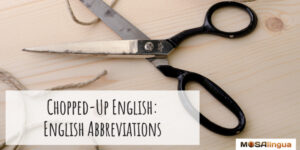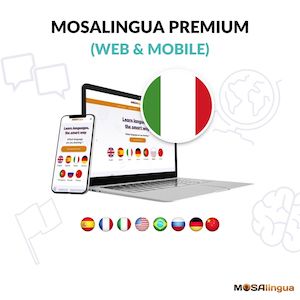Hi! This is Mara from MosaLingua! Welcome to our new series of grammar hacks to quickly learn Italian. Wait, I know what you’re thinking: Italian grammar is hard and boring, but before giving it up give me the chance to explain why Italian grammar is actually very easy. You’ll see that with the right attitude, learning Italian will be not only be easy, but also fun.
Why Italian Grammar Is Easy | Italian Grammar Hacks (Video)
Why Italian Grammar Is Easy | Italian Grammar Hacks (Transcript)
Let’s get started! Unlike other languages, once you learn how to pronounce the letters, most of the work is already done, because Italian pronunciation is very consistent. ]=
For example, in the word “aereo” (airplane) you pronounce all of the vowels (and it has a lot!) Do you want to learn how to pronounce words like “sci” (ski), “chiesa” (church), and “maglione” (sweater)? There are only a few groups of consonants with peculiar pronunciation, and once you learn how to pronounce them you won’t have any problems. In an upcoming video I’ll teach you some tricks for learning how to correctly pronounce even the hardest sounds.
Besides, in Italian the accent position is very predictable: if it’s not on the last syllable, very often is on the second to last. But if you use the wrong stress, we Italians will still probably understand you, so don’t worry!
In Italian there are masculine and feminine words. Luckily, identifying them is very easy. Words that end in “o” are usually masculine. For example, “il gioco” (game), “il libro” (book), “il mostro” (monster).
Words that end in “a” are usually feminine. For example “la strada” (road), “la vita” (life), “la casa” (home). Of course there are exceptions, but you can take things one step at a time. What matters is that these hacks cover 80% of cases you’ll encounter.
In Italian the plural form is very simple. Words ending in “o,” so the ones that are usually masculine, end in “i” when plural. For example, “libro” -> “libri.” Words ending in “a,” those that are usually feminine, end in “e” when plural. For example, “casa” -> “case.”
Another useful hack: Italian uses many words that you already know, because their origins are foreign. Even better, foreign words don’t have a plural in Italian – they don’t change. For example, the singular “computer” is still “computer” when plural, “robot” singular is the same as “robot” plural, the singular “bus” is the same as the plural “bus.”
In Italian there are no cases like in German, Greek and some Slavic languages. In these languages, a word changes according to the situation in which it appears; this isn’t the case in Italian. 😉 If you learn “libro” for example, you can use it like that every single time, because it doesn’t change. It is always libro, or libri if it’s plural.
When you start learning a language, verbs might scare you. The important thing is to begin speaking as early on as possible, even if you don’t know all of the verbs and their conjugations. With time and practice, you’ll learn how to master them.
The good news: Italians often use the present tense to talk about future events. So if you know the present you’ll get by just fine at the beginning! In Italian, there are 3 kinds of verbs: ones that end in “are,” the ones that end in “ere,” and those that end in “ire.”
But all 3 kinds of verbs are conjugated in the same way, so slowly, as you use them, you’ll learn to identify these models. Of course, there are also irregular verbs, but to start you need to focus on the essentials, and everything will be fine.
The last thing I want to talk about is not about grammar, but instead, words. Unlike languages like German or Russian, memorizing Italian words is quite easy. Here’s why: many words come from Latin or Greek, so they’re similar to words in many other languages.
There aren’t many long words that are hard to pronounce or memorize, like in German or Russian. Thanks for watching this video! If you want to find out more about how to learn or improve your Italian easily and quickly, subscribe to our YouTube channel. A presto!
Related posts:
Start improving your Italian today
Good news: we can help!
More good news: you can get started for free! With your free trial, you can test drive the most effective method for learning Italian for the next 15 days!
Vocabulary flashcards, videos with subtitles, audiobooks, articles adapted to your level – with MosaLingua Premium (Web & Mobile), you’ll have access to all this and more. Get started right now. It’s free—and risk-free—to try!






Bonjour,
Excellente vidéo, très bien expliquée.
Merci beaucoup pour votre agréable diction.
👍
Cordialement
Geoffroy